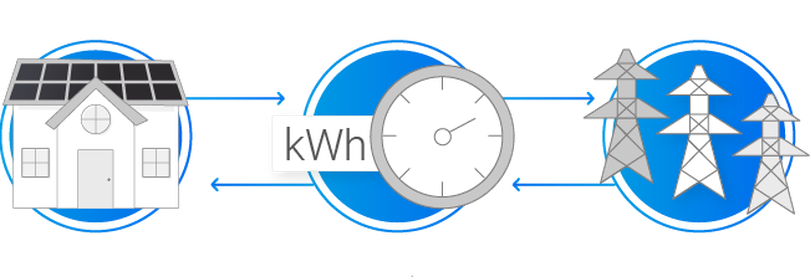Net metering is an electric billing tool that uses the electric grid to “store” excess energy produced by your solar panel system. Under net metering, the energy produced by your solar panels that you don’t use is credited back to you
On a cloudy or rainy day when your panels aren’t producing enough energy, the utility grid will feed your home energy and count that energy against the credits you’ve banked over time. As a solar customer, you will only be billed for your “net” energy usage.
Also known as net energy metering or NEM, net metering is the solar industry’s foundational policy. Here’s what you should know about it.
How does net metering work?
Say you’ve installed a solar panel system and you live in an area with a net metering program. When your photovoltaic system produces more electricity than you’re using at any point during the day, the electricity is sent back to the grid, running your electric meter in reverse.
When your energy use is higher than your solar panel production, either at night or on cloudy days, you’ll pull electricity back from the grid, running your meter forward. At the end of the month or year, you’ll be billed the net amount of what you send to the grid and what you pull from the grid: hence “net metering”.
With a correctly sized solar energy system, you can produce enough electricity to match your home’s electricity use for the entire year. However, the amount of electricity your solar panels produce will vary throughout the year––more in sunnier summer months and less when the sun is lower in the sky and sets earlier in the winter. Net metering helps you to account for these seasonal differences in solar production by crediting you for the excess electricity your panels produce so that you can use it at a later date.

Why net metering is the best
Net metering is the best solar policy because it allows you to store every unit of energy you produce with solar to be used at a later date from the grid. It helps you save thousands of dollars over the lifetime of your solar panel system.。
While net metering isn’t the only way utilities compensate homeowners for going solar, it’s by far the most common and effective solar policy at the moment. If you’re interested in learning more, visit the Database of State Incentives for Renewables and Efficiency (DSIRE®), which tracks net metering and other solar incentives and rebates.